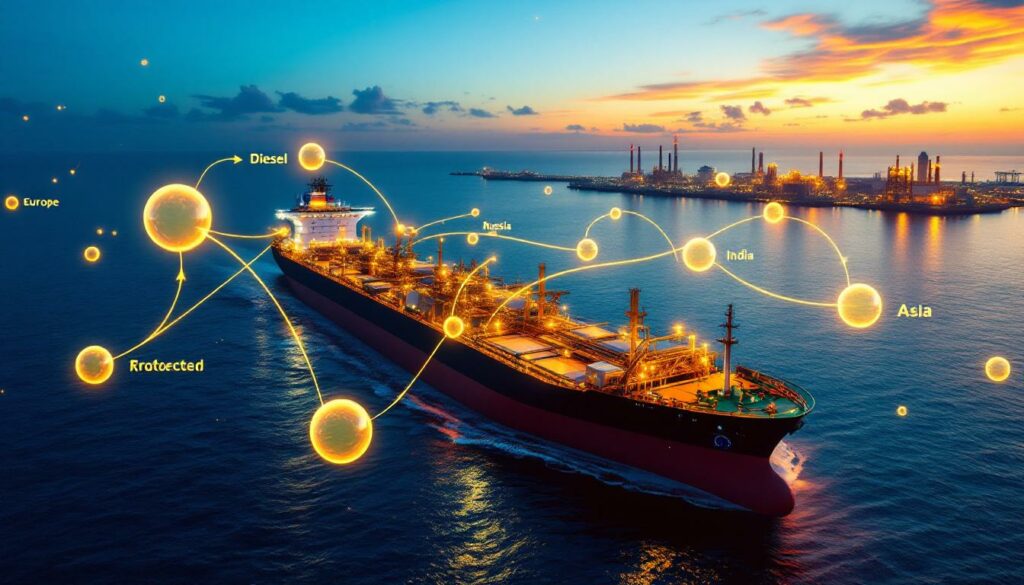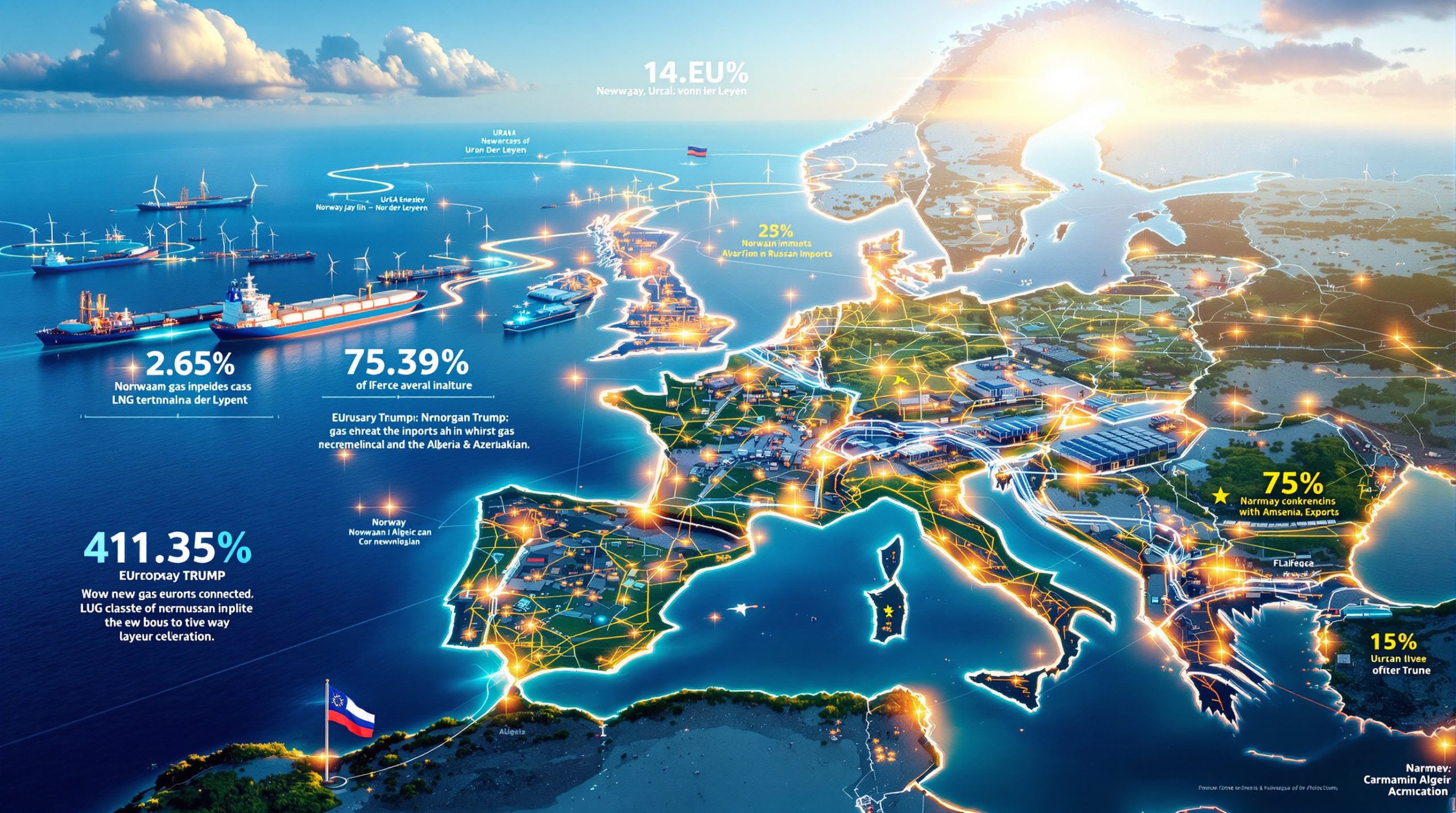Europe's Russian Diesel Ban: Complex Challenges for Global Supply Chains
Europe's efforts to reduce energy dependence on Russia have fundamentally transformed global oil trade patterns. As policy focus shifts from crude oil to refined products—particularly diesel—increasingly complex challenges emerge in tracking fuel origins and preventing supply disruptions. The intertwined nature of global refining networks has created a regulatory puzzle that tests the limits of sanctions enforcement while raising critical questions about can Europe block Russian diesel without fueling a supply crunch.
According to industry analysts at Sparta Commodities, "Keeping track of the origin of each single molecule of diesel around the world is a near-impossible task," highlighting the fundamental challenge facing European regulators.
What Makes Russian Diesel Sanctions So Challenging to Implement?
The Molecular Tracing Problem
The technical reality of diesel production creates an almost insurmountable challenge for sanctions enforcement. Once Russian crude is processed in refineries outside Europe—particularly in India, Turkey, and Gulf states—the resulting diesel becomes virtually indistinguishable from products refined from other crude sources. This "molecular anonymity" creates significant enforcement hurdles for European regulators attempting to block Russian-origin fuels.
As Neil Crosby via Sparta Commodities notes in their August 2025 analysis, "Since the war began, refiners in India, Turkey, and the Gulf have taken in Russian crude, processed it, and shipped the resulting fuel to Europe." This trade remains legal despite appearing to sidestep the spirit of sanctions.
The Co-Processing Complication
Many refineries worldwide blend crude oil from multiple sources before processing, making it technically impossible to determine what percentage of any diesel shipment originated from Russian crude. Without sophisticated molecular tracking technology (which doesn't currently exist at scale), regulators must rely on documentation and shipping records that can be easily obscured through various trading mechanisms.
This creates a fundamental dilemma for European policymakers. As the Oilprice.com analysis explains, "If the bloc wants to limit imports of anything suspected of being refined from Russian crude, it will simply have to ban imports from any country known to import the raw material"—a drastic measure with far-reaching implications.
Regulatory Enforcement Limitations
European authorities face significant practical constraints in verifying fuel origins:
- Limited access to complete supply chain documentation
- Inability to chemically distinguish Russian-derived molecules
- Insufficient resources to track complex global trading patterns
- Challenges in coordinating enforcement across multiple jurisdictions
These limitations create opportunities for regulatory arbitrage, where diesel molecules of Russian origin can effectively "disappear" into the global supply chain, only to reappear as seemingly compliant products.
How Would Stricter Diesel Sanctions Affect European Energy Security?
Europe's Declining Refining Capacity
The European refining sector faces structural challenges that complicate any attempt to reduce diesel imports. As Oilprice.com highlights, "Across the continent, tighter emissions targets, weak margins, and ageing infrastructure are pushing plants offline at a rapid pace this year. As these units disappear, so too does a degree of energy independence."
The closure of facilities like Prax's Lindsey site in the UK exemplifies this trend, with several factors driving the decline:
- Multiple refinery closures across the continent
- Aging infrastructure requiring significant capital investment
- Tightening emissions regulations increasing operational costs
- Weak refining margins making new investments unattractive
This declining domestic capacity increases Europe's vulnerability to supply disruptions if import restrictions are tightened, potentially creating energy security risks that could undermine broader economic stability.
Persistent Diesel Demand Despite Green Initiatives
Despite ambitious decarbonization goals, Europe's diesel demand remains robust across several critical sectors. According to industry analysis, "Demand, by contrast, remains reasonably robust. Diesel powers logistics, agriculture and heavy industry. While alternatives are gaining ground, they are not yet capable of filling the gap."
This persistent demand spans several essential economic activities:
- Commercial transportation and logistics networks
- Agricultural machinery and food production
- Heavy industry and manufacturing operations
- Construction and infrastructure development
Alternative fuels and electrification, while growing, cannot yet replace diesel's role in these essential economic activities, creating a difficult transition period that requires careful management.
Supply Security vs. Sanctions Effectiveness
European policymakers face a difficult balancing act between:
- Enforcing meaningful sanctions that reduce Russian revenues
- Ensuring adequate diesel supplies for economic stability
- Managing potential price volatility during transition periods
- Addressing the environmental impact of longer supply chains
This balancing act requires nuanced policy approaches that consider both short-term energy security needs and longer-term geopolitical objectives.
What Global Trade Flow Shifts Would Result From Stricter Sanctions?
Rerouting of Russian-Origin Diesel
If Europe implements stricter diesel import restrictions, global trade patterns would likely adapt through complex rerouting mechanisms. Industry experts predict that "If enforced strictly, such rules may shift trade patterns again. Diesel, once headed for Europe, may find a new home in Latin America or Asia. Meanwhile, Europe could draw more fuel from the US or East Asia."
This rerouting would likely manifest through:
- Redirecting Russian-linked diesel to markets in Latin America and Asia
- Increasing shipments from US and Asian refineries to Europe
- Creating more complex trading patterns with multiple intermediaries
- Developing new blending and relabeling operations in third countries
These shifts would create both challenges and opportunities for market participants, potentially reshaping global diesel trade flows for years to come.
Impact on Shipping and Logistics Networks
The restructuring of diesel trade flows would significantly affect maritime transportation networks. As noted by Sparta Commodities, "Freight costs, arbitrage spreads and shipping availability would all need to adjust. These transitions are rarely smooth, and market dislocation remains a risk."
Specific impacts would likely include:
- Longer shipping routes increasing carbon emissions
- Higher freight costs due to extended voyages
- Greater demand for tanker capacity
- More complex documentation and compliance requirements
These logistical challenges could create temporary market dislocations that affect not only fuel prices but also the broader costs of goods movement throughout the European economy.
Price Implications Across Different Markets
Trade flow disruptions would likely create regional price disparities across global diesel markets:
| Region | Potential Price Impact | Driving Factors |
|---|---|---|
| Europe | Moderate to significant increases | Reduced supply options, higher freight costs |
| Asia | Potential decreases in some markets | Increased availability of Russian-origin diesel |
| North America | Potential increases | Greater export demand to Europe |
| Middle East | Mixed effects | Opportunity for increased refining margins but higher crude costs |
These price differentials would create both challenges and opportunities for market participants, potentially reshaping global trade flows as arbitrage opportunities emerge.
Can Alternative Diesel Sources Meet European Demand?
U.S. Export Potential
American refineries could increase diesel exports to Europe, but several factors limit this option:
- U.S. refineries already operating at high utilization rates
- Domestic demand fluctuations affecting export availability
- Higher shipping costs across the Atlantic
- Different fuel specifications between markets
While U.S. exports represent a potential alternative source, the logistical challenges and capacity constraints suggest they cannot fully replace Russian-linked supplies without significant price premiums.
Middle Eastern Refining Expansion
Gulf states are expanding refining capacity, potentially offering alternative supplies:
- New mega-refineries coming online in Saudi Arabia and Kuwait
- Strategic interest in securing European market share
- Sophisticated facilities capable of meeting European specifications
- Established trading relationships with European importers
These expanding capacities represent one of the most promising alternatives to Russian-linked diesel, though transportation distances remain longer than traditional supply routes.
Asian Refining Capacity
Asian refiners, particularly in China, South Korea, and India, could redirect exports to Europe:
- Significant excess capacity in some markets
- Modern, efficient refining infrastructure
- Growing interest in expanding global market presence
- Ability to produce high-quality diesel meeting European standards
However, as noted in industry analyses, some of these same refineries currently process Russian crude, creating potential complications for sanctions compliance if stricter origin requirements are implemented.
What Are the Broader Geopolitical Implications?
Impact on Russian Oil Revenues
The primary goal of tighter diesel sanctions would be reducing Russian oil revenues, but effectiveness depends on numerous factors. As Oilprice.com explains, "The intention may be to simply force countries like India, Turkey to stop buying Russian crude altogether and therefore put pressure on Russian oil revenues."
The actual impact will depend on:
- Russia's ability to find alternative markets
- Price discounts needed to secure new buyers
- Adaptation of trading networks to circumvent restrictions
- Development of alternative payment mechanisms
These variables make it difficult to predict the precise revenue impact of stricter diesel sanctions, though they would likely increase pressure on Russia's energy export sector.
Pressure on Non-European Countries
Stricter European sanctions would increase pressure on countries like India and Turkey to make difficult choices regarding their energy relationships. Combined with other international measures, this creates what analysts describe as "something of a pincer move" on countries processing Russian crude.
These nations would face pressure to:
- Choose between access to European markets and discounted Russian crude
- Develop more sophisticated mechanisms to obscure oil origins
- Negotiate exemptions or special arrangements
- Potentially face secondary sanctions from Western nations
This pressure could reshape global energy relationships, potentially creating new alignments in international energy trade.
Potential for International Coordination
The effectiveness of European diesel sanctions would be significantly enhanced by:
- Coordination with US tariff pressures
- Alignment with other G7 and OECD countries
- Technical assistance to improve tracking capabilities
- Shared intelligence on sanctions evasion attempts
Without such coordination, the risk of "leakage" through alternative supply chains increases substantially, potentially undermining the policy objectives of sanctions programs.
What Are Practical Solutions to the Diesel Dilemma?
Phased Implementation Approaches
Rather than immediate comprehensive bans, Europe could consider:
- Gradual reduction targets for Russian-linked diesel
- Sector-specific exemptions for critical industries
- Temporary waivers during supply disruptions
- Seasonal adjustments based on demand patterns
These nuanced approaches could help balance the competing objectives of sanctions enforcement and energy security during a challenging transition period.
Enhanced Tracking Technologies
Investment in better tracking systems could improve sanctions effectiveness:
- Blockchain-based certification of crude origins
- Advanced chemical markers for Russian crude
- Artificial intelligence to analyze trade patterns
- Satellite monitoring of shipping movements
While promising in theory, these technologies face significant implementation challenges in a global market where participating actors may have conflicting interests regarding transparency.
Domestic Refining Incentives
Policies to support European refining capacity could reduce import dependence:
- Tax incentives for refinery modernization
- Streamlined permitting for capacity expansions
- Support for carbon capture technologies
- Public-private partnerships for strategic facilities
Such measures could help reverse the trend of declining European refining capacity, though they would need to be balanced against broader decarbonization objectives.
FAQ: European Diesel Sanctions
When will Europe's stricter diesel sanctions take effect?
Current proposals suggest implementation could begin in January 2026, though timelines remain subject to political negotiations and may be affected by trade war oil movements and geopolitical developments.
How much diesel does Europe currently import?
Europe imports approximately 600,000-700,000 barrels per day of diesel, with a significant portion coming from refineries processing Russian crude oil outside the bloc.
Will diesel prices increase for European consumers?
Some price increases are likely, especially during the transition period, though the extent will depend on how successfully alternative supply chains develop and whether markets experience oil price stagnation or volatility.
How will commercial transportation be affected?
The logistics sector may face higher fuel costs and potential supply uncertainties, which could increase shipping rates and ultimately consumer prices for transported goods.
Can renewable diesel replace Russian imports?
While renewable diesel production is growing rapidly, current capacity is insufficient to replace conventional diesel imports in the near term. Scaling up production would require significant investment and time.
Navigating an Uncertain Future
As industry experts at Sparta Commodities conclude, "What happens next may depend less on political resolve than logistical nuance. Banning Russian diesel outright sounds decisive. Enforcing it in practice will be harder." This assessment captures the fundamental challenge facing European policymakers as they attempt to balance energy security, sanctions effectiveness, and economic stability.
The coming years will likely see a complex dance between regulators, refiners, traders, and shippers as all parties adapt to changing rules in an environment where, as one industry observer noted, "diesel markets are nothing if not adaptable." Past sanctions and disruptions have forced market participants to find new routes and trading patterns, and the Russian diesel ban will likely drive similar innovation, albeit with significant transition costs.
The ultimate test of Europe's policy will be whether it can meaningfully reduce Russian energy revenues while maintaining sufficient diesel supplies to power essential economic activities. Threading this needle will require sophisticated policy approaches, international coordination, and realistic timelines that acknowledge the complex realities of global energy markets and the tariffs' investment impact on broader economic activity.
Moreover, understanding the full trade war market implications will be essential for businesses and investors navigating this uncertain landscape. According to the European Parliament's analysis, these policy shifts will have cascading effects across multiple sectors of the European economy.
Disclaimer: This analysis contains forward-looking statements about energy markets and policy developments. Actual outcomes may differ significantly based on political decisions, market conditions, and technological developments. Readers should consult qualified energy market specialists before making business or investment decisions based on these projections.
Want to Invest in the Next Major Mineral Discovery?
Discovery Alert's proprietary Discovery IQ model delivers instant notifications when significant ASX mineral discoveries are announced, turning complex geological data into actionable investment insights. Explore why historic discoveries can generate substantial returns by visiting Discovery Alert's dedicated discoveries page and position yourself ahead of the market.




